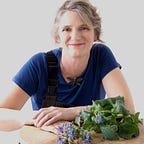International Compost Awareness Week — ‘Future as Now’ visions
This year ICAW is May 2–8, a chance for composters all over the world to speak up freely about their work.
I asked my audience to share their ideas for the future role of composting, and to write it in a ‘future as now’ statement.
Do you have ideas you’d like to add?
I’m thinking of future as 5–10 years from now, because it’s close enough that we could get to work right now. So many avid gardeners and composters are trying to build communities where healthy soil is connected to our food, our daily lives, and also helping us connect to each other.
Let’s deepen this discussion…
Here are some of the responses so far:
“Compost bins everywhere with community gardens. This would have the potential to decrease mental health problems as well as decreasing poverty as more people would get a chance to eat nutrient dense food and learn how to grow food from food. Plus would decrease mental health as people can connect more to nature and feel apart of the community. Also has the potential of bringing back communities and knowing your neighbour etc.”
Many of us tend to connect compost with community gardens, food rescue and home gardening. But what we sometimes forget is that healthy soil is such an essential part of our food system. By sending food scraps to landfill, we are depriving future generations of the resources they will need to grow food in soil.
Compost is essential within our lives. The world is running out of top quality soil and compost is an essential component that will allow us to regenerate our soil so that we can produce healthy food. Not only this but it is also an easy and convenient way for us to reduce our food scraps that go to the landfill, therefore helping us reduce our impact on our environment.
Composting is part of rubbish collection in every building and institution, just like landfill rubbish and recycling. At first they introduced financial incentives to compost by reducing rubbish collection costs for institutions who managed to increase their compost and decreased their landfill output. Composting is taught for free in schools, universities, community groups and provided for workplaces, and so it has become the norm.
Houses are no longer built with a “waste disposal unit.” Instead every house is built with space and equipment to do composting of some sort. Apartment buildings all have communal places and gear for shared compost making.
This next idea is something that featured highly in the original business plan for Blue Borage — compost parties.
People make compost in their own gardens through offering home-based compost workshops.
Do you have ideas you’d like to add?
Thanks for taking part in International Compost Awareness Week!
~Katrina🌱
Ideas for innovative edible gardening solutions using biodynamic methods to make ‘soil with soul’ is what New Zealand needs right now. For tips, advice and online courses go to www.blueborage.co.nz or get in touch by email at katrina@blueborage.co.nz
